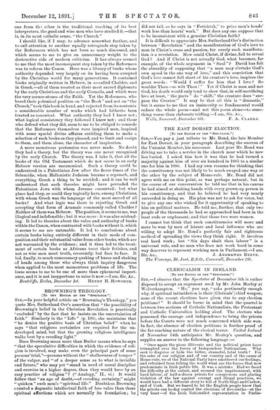BROWNING'S THEOLOGY.
[To THE EDITOR OF THE "SPECTATOR"] Sin,—In your helpful article on " Browning's Theology," you quote Mrs. Sutherland Orr's assertion that "the possibility of Browning's belief in the Christian Revelation is practically 'excluded' by the fact that he insists on the uncertainties of faith." Similarly in the " Life " (p. 185), she maintains that ." he denies the positive basis of Christian belief" when he says "that religious certainties are required for the un- cleveloped mind, but that the growing religions intelligence walks best by a receding light."
Does Browning mean more than Butler means when he says ." that the speculative difficulties in which the evidence of reli- gion is involved, may make even the principal part of some persons' trial,"—persons without the " shallowness of temper" of the vulgar, and "of a deeper sense as to what is invisible and future," who may yet "stand in need of moral discipline and exercise in a higher degree, than they would have by an easy practice of religion " ? (" Analogy," II., vi.) It would follow that "an age of doubt,—of receding certainty," might " quicken " such men's "spiritual life." Doubtless Browning counted a dogmatic intellectual faith of less value than those spiritual affections which are normally its foundation ; he did not fail, as he says in " Feriahtah," to prize men's heads' work less than hearts' work." But does any one suppose that to be inconsistent with a genuine Christian faith P
It is difficult to appreciate Mrs. Sutherland Orr's distinction between "Revelation" and the manifestation of God's love to man in Christ's cross and passion, for surely such manifesta- tion is a revelation. How could Christ, if divine, fail to reveal God ? And if Christ is not actually God, what becomes, for example, of the whole argument in " Saul "? David has felt the absurdity of supposing that "a man may o'ertake God's own speed in the one way of love," and this conviction that God's love cannot fall short of his creature's love, inspires the great words : "Would I suffer for him that I love ? So wouldst Thou—so wilt Thou!" Yet if Christ is man and not God, his death would only tend to show that, in self-sacrificing love at least, the parts" do "shift," the creature does "sur- pass the Creator." It may be that all this is "dramatic," but it seems to me that an insincerity so fundamental would reduce the whole poem—and not this poem alone—to some- thing worse than elaborate trifling.—I am, Sir, Scc., Wells, Somerset, December 8th. F. A. CLARKE.










































 Previous page
Previous page